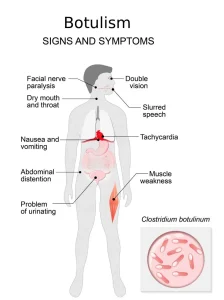Overview
Diagnosis of Botulism
Botulism is typically diagnosed based on a physical exam, symptom review, and patient history.
-
Symptom assessment: Your provider checks for muscle weakness, paralysis, drooping eyelids, and a weak voice.
-
Food and exposure history: Your provider asks about recent foods eaten or potential wound exposures.
-
Infant-specific questions: For possible infant botulism, the provider may ask if your child has eaten honey, is constipated, or is less active than usual.
-
Laboratory tests: Blood, stool, or vomit may be analyzed for botulinum toxin. Results may take days, so the physical exam is key for early diagnosis.
Treatment of Botulism
Treatment varies depending on the type of botulism and severity of symptoms.
Foodborne Botulism
-
Digestive clearing: Vomiting may be induced, and medications can help move contents through the bowels.
Wound Botulism
-
Surgery: Infected tissue may need to be removed to stop bacterial growth.
Cosmetic or Medical Botulinum Injections
-
Symptom resolution: Effects usually improve as the toxin is absorbed by the body.
Antitoxin Therapy
-
Purpose: Antitoxin binds to circulating toxin to prevent further nerve damage.
-
Limitations: It cannot reverse existing damage, but nerves may repair over time. Recovery can take months and often requires rehabilitation therapy.
-
Infant-specific antitoxin: Botulism immune globulin is used to treat infants.
Antibiotics
-
Use in wound botulism only: Antibiotics help control the infection in wounds.
-
Not recommended for other forms, as they may increase toxin release.
Breathing Assistance
-
Mechanical ventilator: May be required if breathing is impaired.
-
Duration: Can last several weeks while the body recovers from toxin effects.
Rehabilitation
-
Purpose: Helps restore speech, swallowing, and muscle function affected by botulism.
-
Methods: Physical, occupational, or speech therapy as needed.
Preparing for Your Appointment
You may start with your primary care provider or be referred to a hospital for urgent care. Specialists may include:
-
Neurologist
-
Infectious disease specialist
What to bring:
-
Symptoms: List all, including seemingly unrelated ones.
-
Personal information: Stressors, recent life changes, family medical history.
-
Medications and supplements: Include doses.
-
Questions for your doctor: Examples below.
Questions to Ask Your Doctor
-
How did I get botulism?
-
Will I have any lasting problems?
-
What side effects can I expect from treatment?
-
Are there dietary restrictions?
-
How can I prevent recurrence?
What to Expect From Your Doctor
Your provider may ask:
-
When did your symptoms begin?
-
Are symptoms continuous or occasional?
-
How severe are your symptoms?
-
Have you or your child eaten home-canned food recently?
-
For infants: Has the baby eaten honey?
-
Did anyone else consume the suspected food?
Advertisement

